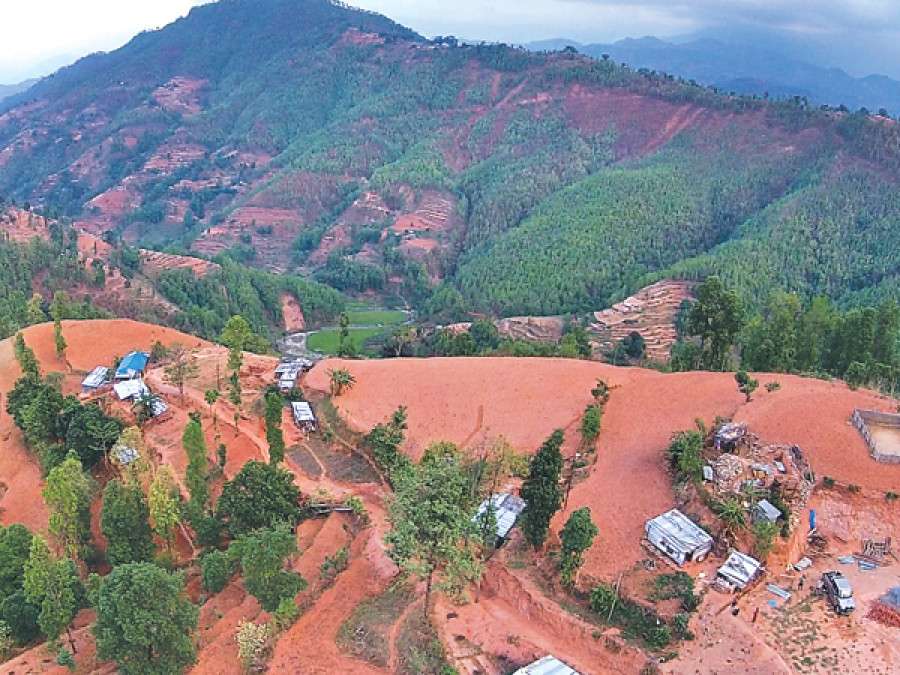Miscellaneous
The waiting game
At Siru Bari, a quaint hamlet in Nuwakot ravaged by last year’s quakes, patience is wearing thin
Dibesh Karmacharya
Tucked away in the lap of the Langtang valley in the Nuwakot district, Siru Bari is a small village with 63 households dotted across many rolling hills. Here, the red of the tin-roof houses reflect brightly against the backdrop of surrounding green forests and the Himalayas beyond. Quiet, verdant and unassuming, you’d be forgiven for thinking that if a heaven existed, it would look like this.
Last April, Dan Bahadur Tamang had just turned 73. Like most of the other locals, he too had just headed out for a long afternoon in the fields tilling the earth, when that very earth began to buckle under his feet. His wife, Maya Tamang, was inside their two-storey house. She fled the crumbling mud and brick house and rushed out into the field just in the nick of time.
Like so many other similar settlements, in just a few moments their whole world, as the Tamangs knew it, came crashing down. Nearly all the other houses in the area faced similar fates. Now a year later, few of the residents have been able to put pieces of their shattered lives back together. Many are still waiting for help—help that seems to elude them time and again.
Left without even a roof over their heads, Dan Bahadur and his family started erecting structures with corrugated sheets as rooftops, sourcing the walls with whatever resources they could scrap from the carnage the quakes left behind. Some aid came through the many NGOs and INGOs that came in like seasonal flu. But that too would slow down into a trickle before disappearing altogether. News that the government would be sending in relief materials and cash still arrests the villagers with hope. That waiting game, however, continues to drag on.
Dan Bahadur worries. To add to their woes, the unpredictable pre-monsoon patterns this year left Siru Bari’s residents veritably alarmed. If the rains do not come on time, the village’s food source is nipped in the bud, further jeopardising this already vulnerable settlement. Just like Dan Bahadur, Ramesh Tamang too looks upon the skies every day. He uses his two oxen to prepare his field to sow corn. The dark rain-soaked clouds have been circling around their heads, promising some rain—a promise that has kept farmers like Dan Bahadur and Ramesh sticking around, despite the many challenges.
In the evening, as we sit in Dan Bahadur’s already dilapidated two-storey house, Maya brings in a warm glass of tea from the kitchen. We sit on a straw mat and talk about life, its hardships and the couple’s failing health. Maya is almost 66, and is plagued by a persistent knee problem. She could descend to Kathmandu and have them checked out, but the last time she did that, the doctors came up with an inconclusive diagnosis. She has since decided she would “wait and see”, and ambles in and out of her kitchen gritting her teeth.
Despite being a town that is not too far away from the Capital, this village is miles behind in terms of development. The village is yet to connect water pipes to a spring source, forcing residents to walk 40 minutes just to procure water. Electricity too has only recently reached their village from a hydropower plant in Trishuli. Most of the households, however, continue to dangerously hook wires to high tension lines that pass through the village.
As we move inside the kitchen to have dinner, Maya pours a glass of local rice whiskey for me and Dan Bahadur, and serves us a generous and humble meal of rice, potato curry and lentil soup. I had met them for the first time earlier that day, yet their hospitality and kindness made it seem like I had known them for ages. The wrinkles in their faces told stories of the struggles they had endured, yet it did not limit their hospitality or kindness.
After dinner, as I converse with the residents, I realise that, despite the odds, not all is gloomy at Siru Bari. Along with usual stories of local youth heading out abroad for jobs, there were proud disclosures about some recent high school graduates who were also sticking around and busying themselves with a range of entrepreneurial work. Laxman Tamang just finished his School Leaving Certificate, and unlike most of his friends, he has decided not to go to Kathmandu or the Middle-East. He wants to stick around. With some support from his family, he has established a chicken farm with an initial flock of a 1,000 birds. He already has plans to increase that number to 5,000; his persistence is slowly, but surely, paying off.
Eventually, I go back to Dan Bahadur’s house to settle for the night. Maya and Dan Bahadur lay out a straw mat on the red mud floor and I take out my sleeping bag to call it a night. As I try to fall asleep, replaying the sounds, sights and taste of this journey, I hear the clouds grinding against each other and thunder rolling from one end of the sky to the other. I hear rain drops hitting the roof and cool air frantically whooshing through this quaint hamlet. I sigh with relief. The rain has come. Tomorrow they may be able to sow their corn.
Siru Bari wants to rebuild and move on, but they have been left waiting a while. And like the clouds pregnant with foreboding, looming large over the hamlet, their patience too is about to break.
Karmacharya is Executive Director at Centre for Molecular Dynamics-Nepal




 17.9°C Kathmandu
17.9°C Kathmandu










